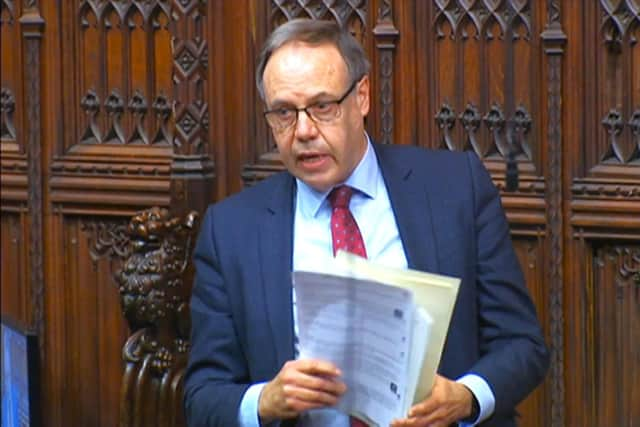DUP-Tory deal on Irish Sea border: Nigel Dodds argues the Protocol could see NI drift apart from GB on immigration - becoming 'a magnet for asylum seekers'
and live on Freeview channel 276
The DUP grandee is attempting to amend the government's Rwanda asylum bill in order to guarantee it will apply in Northern Ireland just as much as it does in Great Britain.
It comes after Lord Dodds and other top DUP figures voiced disagreement with the party leadership’s position that the new deal struck with the Tories means that the Irish Sea border has been effectively dissolved.
Advertisement
Hide AdAdvertisement
Hide AdThe Rwanda bill is a hugely controversial one, and effectively says the government reserves the right to fly asylum seekers who arrive in the UK to the tiny east African nation, so they can claim asylum there instead.


Labour has naturally opposed the plan, but so too have many Conservatives, who argue it would only be a token law.
That's because the plan may only apply to a small number of asylum seekers, who themselves make up only a fraction of the total number of immigrants coming to the UK – see details about how many people are coming to the UK and from where at this link.
For weeks the DUP has been voicing concern that the Protocol would hamper its application in NI, and last night Lord Dodds stressed that "immigration law has always applied with equal effect right across the UK; otherwise, the danger is that one part of the country will be operating different rules, with all the attendant consequential problems that would arise".
Advertisement
Hide AdAdvertisement
Hide AdLord Dodds said that Article 2 of the Protocol guarantees "no diminution of rights for Northern Ireland compared with what previously existed under the Belfast Agreement".
He argued that this means the EU's Charter of Fundamental Rights, which includes a segment on the rights of asylum seekers, will continue to have sway over Northern Ireland even though the rest of the UK ditched it with Brexit.
"Is it not the case," Lord Dodds said, "that Northern Ireland is in fact not now in the same position – or would not be in the same position – as the rest of the UK, were this Bill to proceed unamended?
"If there is no problem then the minister should have no difficulty in accepting the amendment in my name, which will clarify beyond any shadow of a doubt that the principle of the Bill – whatever the merits of it – should be that it applies across the board across the United Kingdom; otherwise, we will find that Northern Ireland will become a magnet for asylum seekers and others.
Advertisement
Hide AdAdvertisement
Hide Ad"They will say that the less rigorous application of procedures and sanctions will not apply in Northern Ireland. Therefore, people will want to move there…
"Then, not only will we have a trade border, but potentially a people border at some point in the future."
He said the bill is "another example" of how Northern Ireland faces "the direct application of EU law, uniquely within this United Kingdom".
"That raises very serious constitutional issues and very serious issues about democracy itself," he concluded.
Advertisement
Hide AdAdvertisement
Hide AdLord Stewart of Dirleton, the Tory advocate-general for Scotland, responded that "the bill will apply in full in Northern Ireland, as it will across the whole UK".
The Home Office, which is driving through the bill, has been asked if it will accept Lord Dodds' amendment, which seeks to add the unambiguous words: "the provisions of this Act have effect in Northern Ireland".
It said: “Bold, innovative solutions are needed to tackle illegal migration and that is exactly what we are doing with this ground-breaking legislation.
“The Rwanda Bill has been drafted to remain within our international obligations.
"The Bill will apply in full in Northern Ireland, and the Government is clear that nothing in the Windsor Framework affects its proper operation on a UK-wise basis.”